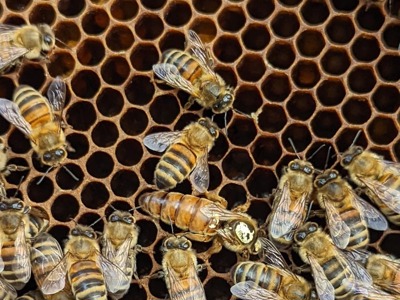
Bees at Battersea Park Children's Zoo
28th Apr 2023
We are excited to announce the opening of a new area at Battersea Park Children’s Zoo, an educational apiary in partnership with the London Beekeepers Association!
One of many important new projects to take shape at the zoo, our new area is home to Western honeybee hives, maintained by the dedicated team at the LBKA.
Animal Manager, Jamie Baker, set up this latest project after inviting members of the London Beekeepers Association to BPCZ to discuss the educational benefits of seeing sustainable beekeeping within the zoo, inspiring the next generation to take an interest in pollinating insects.
Tristram Sutton, Apiaries Manager at the London Beekeepers Association had this to say about the project:
“Battersea Park Children’s Zoo has invited the London Beekeeping Association to set up a teaching apiary within the zoo. The apiary hopes to provide an example of more sustainable beekeeping by increasing awareness of the role of pollinators in the urban ecosystem and, by sharing the actual beekeeping between a group of volunteers from the LBKA, providing access to beekeeping for more beekeepers per hive.”
London is a challenging environment for many beneficial insects. The number of managed honeybee colonies in London has doubled in recent years; with the increase in building developments reducing the opportunity for the planting of large flowering trees.
Maintenance of the BPCZ hives takes place weekly, and soon we will share a schedule of when this interesting work takes place for our visitors to watch, learn and appreciate sustainable beekeeping and the work the London Beekeepers Association is doing for bees and wild pollinators.
Our beehives can be found at the back of the zoo, near to the Scottish wildcats! Be sure to take a look during your next visit.
As well as this, budget cuts have led to more low-maintenance and non-flowering planting in many public open spaces, flora that doesn’t encourage native pollinators. Fewer resources for our pollinators have led to increasing competition between insects for diminishing food sources – something that is particularly damaging to wild populations of social and solitary bees, hoverflies, butterflies, moths, wasps and beetles.

Sign up to our newsletter
Join our mailing list in order to keep up to date with Zoo news and special offers.

